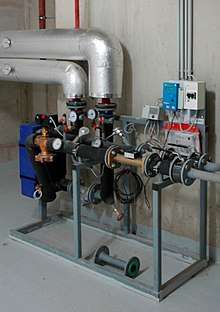Heat meter
A heat meter or flux calorimeter is a device which measures thermal energy provided by a source or delivered to a sink, by measuring the flow rate of the heat transfer fluid and the change in its temperature (ΔT) between the outflow and return legs of the system. It is typically used in industrial plants for measuring boiler output and heat taken by process, and for district heating systems to measure the heat delivered to consumers.

A heat meter attached to a heat exchanger in a District heating substation in a residential neighborhood. Right in white-blue: the calculator; in the center in bronze: the ultrasonic flow meter
It can be used to measure the heat output of say a heating boiler, or the cooling output from a chiller unit.
Elements
A heat meter consists of
- a fluid flow meter - typically a turbine-type flow meter, or alternatively an ultrasonic flow meter;
- a means of measuring the temperature between the outflow and the inflow - usually a pair of thermocouples;
- a means of integrating the two measurements over a period of time - typically half an hour - and accumulating the total heat transfer in a given period.
gollark: I know roughly what it is, I just have no idea how to implement it.
gollark: Probably just needs comments.
gollark: I mean, if the variable names were longer, would you understand it?
gollark: <@111572502722920448> How do you do "software hitboxing"?
gollark: Ah.
See also
- District heating
- Heat cost allocator
- Heating system
- Thermometer
- Universal Metering Interface (UMI)
This article is issued from Wikipedia. The text is licensed under Creative Commons - Attribution - Sharealike. Additional terms may apply for the media files.